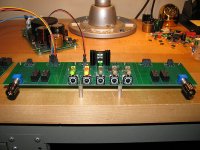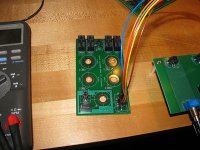I am (trying) to get all the parts together for B1 buffer.. what I want to is "cheat" and use a multiple input selecter and hard wire it to input1 so that I get 4 inputs.. but I am not sure where I can get one?
if you have one laying around I will buy it off you or you can point me to a part # on digikey / mouser
-joe
if you have one laying around I will buy it off you or you can point me to a part # on digikey / mouser
-joe
The Lorlin switches at Mouser are great for the money. They have silver plated contacts, a decent feel, and their size makes them really easy to work with (big solder tabs spaced decently apart). The Electroswitch rotaries from Mouser are popular too. I haven't used them. I have used a Grayhill from Digikey, and it was a little small for my tastes. The fanciest option is to use multiple toggle switches. Both Mouser and Digikey carry C&K, but Electroswitch makes a still decent but more affordable toggle.
Paul
Wild Burro Audio Labs - DIY Full Range Speakers
Paul
Wild Burro Audio Labs - DIY Full Range Speakers
Last edited:
came across this while randomly looking for stuff.
Stereo selector switch
dont know if its any good but looks way cleaner than just a switch with wires soldered onto it.
Stereo selector switch
dont know if its any good but looks way cleaner than just a switch with wires soldered onto it.
Hi,
I've switched most of my gear over to these:
Digi-Key - CKC7004-ND (Manufacturer - A20615RNZQ)
Good bang for the buck and Digikey doesn't charge brokerage.
Cheers!
I've switched most of my gear over to these:
Digi-Key - CKC7004-ND (Manufacturer - A20615RNZQ)
Good bang for the buck and Digikey doesn't charge brokerage.
Cheers!
If you want something like this: http://www.diyaudio.com/forums/pass-labs/158261-novel-control-b1-input-level.html
Then I'd be willing to sell you a set of boards as I had more made than I will use.
Of course, this will probably cost more because of all the relays, but it would be
very cool .
.
Then I'd be willing to sell you a set of boards as I had more made than I will use.
Of course, this will probably cost more because of all the relays, but it would be
very cool
I should explain the setup a little better. There are 3 boards total. The control
board with the micro and buttons and LEDs. Plus the relays for the matching
function and, with the current prototype, the pots. I just ordered new boards
after changing the design to not include the pots. So, I have one of the current
prototypes with the pots already assembled and ready to go. This I don't see
needing, so it is available. Included would be the 2 I/O boards with relays and
holes for RCA jacks as well as connectors. I use all Molex MicroFit3 connectors.
I attached a pic of one of the I/O boards. There would be one for each channel.
There is a relay for each input that switches the ground as well as the signal so
that there is no way for any non-selected source to pollute the audio signal.
There is also a Mute relay that shorts the output. This is the default connection
so that when there is no power to the relay, then the output is shorted. The
input relays are high quality sealed Omron G5V-2 with silver contacts. The mute
relay is an Omron G5V-1, also sealed.
The pots on the control board are Bourns 51 film type that are sealed. Let me
know if you have any questions.
board with the micro and buttons and LEDs. Plus the relays for the matching
function and, with the current prototype, the pots. I just ordered new boards
after changing the design to not include the pots. So, I have one of the current
prototypes with the pots already assembled and ready to go. This I don't see
needing, so it is available. Included would be the 2 I/O boards with relays and
holes for RCA jacks as well as connectors. I use all Molex MicroFit3 connectors.
I attached a pic of one of the I/O boards. There would be one for each channel.
There is a relay for each input that switches the ground as well as the signal so
that there is no way for any non-selected source to pollute the audio signal.
There is also a Mute relay that shorts the output. This is the default connection
so that when there is no power to the relay, then the output is shorted. The
input relays are high quality sealed Omron G5V-2 with silver contacts. The mute
relay is an Omron G5V-1, also sealed.
The pots on the control board are Bourns 51 film type that are sealed. Let me
know if you have any questions.
Attachments
Last edited:
Input selector switches
I have a Yamaha receiver with a very noisy selector switch. Tap it and the audio level goes nuts. It is a "sealed" switch such that I cannot get any contact cleaner into it. I hate it.
All of the switches recommended so far are brass with silver plating. And they seem to be designed for fairly heavy currents - amps. Silver oxidized easily too. I will bet that over time they will get noisy because most audio signal paths are "dry" circuits. Current < 10 ma. There is just not much current/voltage thru the switch contacts to keep it them clean and break thru the oxide. I want a gold plated contact if I am going to use it for an input selector switch. Ideas?? Thoughts?
Personally, I would use relays with low current rated gold contacts and logic to get it done.
I have a Yamaha receiver with a very noisy selector switch. Tap it and the audio level goes nuts. It is a "sealed" switch such that I cannot get any contact cleaner into it. I hate it.
All of the switches recommended so far are brass with silver plating. And they seem to be designed for fairly heavy currents - amps. Silver oxidized easily too. I will bet that over time they will get noisy because most audio signal paths are "dry" circuits. Current < 10 ma. There is just not much current/voltage thru the switch contacts to keep it them clean and break thru the oxide. I want a gold plated contact if I am going to use it for an input selector switch. Ideas?? Thoughts?
Personally, I would use relays with low current rated gold contacts and logic to get it done.
I have a Yamaha receiver with a very noisy selector switch. Tap it and the audio level goes nuts. It is a "sealed" switch such that I cannot get any contact cleaner into it. I hate it.
All of the switches recommended so far are brass with silver plating. And they seem to be designed for fairly heavy currents - amps. Silver oxidized easily too. I will bet that over time they will get noisy because most audio signal paths are "dry" circuits. Current < 10 ma. There is just not much current/voltage thru the switch contacts to keep it them clean and break thru the oxide. I want a gold plated contact if I am going to use it for an input selector switch. Ideas?? Thoughts?
Personally, I would use relays with low current rated gold contacts and logic to get it done.
That go me thinking... so I checked the Omron data sheet. The G5V-2 is
designed for low level signal switching. It has gold plated silver contacts.
I knew there was a reason that I picked those relays.
- Status
- This old topic is closed. If you want to reopen this topic, contact a moderator using the "Report Post" button.

